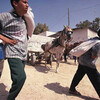
Damage and losses to agriculture, fisheries and forestry in Lebanon as a result of last summer’s hostilities are estimated at around $280 million, according to an FAO damage assessment report issued today. The conflict affected the agriculture sector directly, with crops, livestock and equipment damaged by the bombing. But much more important, according to the report, was the indirect economic impact in terms of lost markets and labour opportunities. The biggest economic losses were attributed to the lack of access to fields during the conflict period, the peak time for the harvest of some crops (mainly stone fruit and potatoes) destined for export. Read more about Lebanon: damage to agriculture, fisheries and forestry estimated at around $280 million

United Nations Relief and Works Agency for Palestine Refugees in the Near East, UN Office for the Coordination of Humanitarian Affairs, World Food Programme, World Health Organization, UN Food and Agriculture Organization, United Nations Children's Fund, United Nations Population Fund (UNFPA) and United Nations Development Fund for Women (UNIFEM)
3 August 2006
The United Nations humanitarian agencies working in the occupied Palestinian territory are deeply alarmed by the impact continuing violence is having on civilians and civilian infrastructure in Gaza, which has resulted in a sharp decline in the humanitarian situation facing 1.4 million people, more than half of them children. We are concerned that with international attention focusing on Lebanon, the tragedy in Gaza is being forgotten. We estimate that since 28 June, 175 Palestinians have been killed, including approximately 40 children and eight women, and over 620 injured in the Gaza Strip. Read more about UN Agencies: Deeply alarmed by continuing violence in Gaza

Better information on the number and the state of poor people without access to adequate food in the West Bank and Gaza Strip will help reduce the number of food insecure people there, FAO said today. A new FAO project aims to provide the Palestinian Authority with updated information on poor households and groups and the causes of their food insecurity. This analysis will enable decision-makers to better target vulnerable groups and improve the design and implementation of emergency interventions and sustainable development programmes. Food insecurity is a reality for 40 percent of the 3.6 million people living in the West Bankand Gaza Strip and a near constant threat for an additional 30 percent of the population, according to a 2003 FAO assessment. Read more about Forty percent Palestinians in OPT food insecure

The UN Food and Agriculture Agency has alerted Israel, the West Bank and Gaza, Saudi Arabia and Sudan of the possibility of a few desert locust swarms arriving from northern Egypt. “It is possible that a small number of locust swarms could arrive in these countries,” said Mahmoud Solh, Director, Plant Production and Protection Division. “Countries should not expect successive waves of swarms like in the Maghreb countries; there is definitely no reason to panic,” he said. FAO called upon countries to look out for any locust swarms and undertake control operations as early as possible. Swarms have now moved further east towards the Sinai, the Gulf of Suez and the Red Sea. Locusts have already arrived on the Mediterranean coast of northern Sinai, 100 kilometres west of Gaza. Read more about A few locust swarms could cross Gulf of Suez and Red Sea, FAO warns



